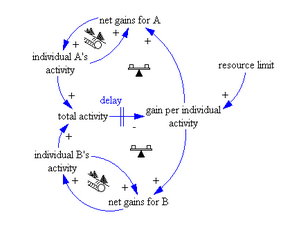Is working within the capitalist system preferred to other actions when one does not expect Capitalism to topple within one’s lifetime? Obviously not.
What is it with the people who have taken the road of compromisation to direct arrows or morality and condescention to those of us who have recognised it for the sham it is and choose to act appropriately? It is not the first time I’m reading this kind of appeal to emotion, but the difference is that this time the argument comes from a self-identified socialist who even flies and red and black flag.
So this latest argument (in Greek) basically says the following:
- Capitalism is bad and many of us struggle to topple it in favour of socialism.
- But realistically this will not happen within out lifetimes. If that is the case, why do we still struggle instead of just living a normal life?
- Is it because we want to help the downtrodden nevertheless? But in that case, centrist politics are a better path since those have the possibility of making an actual change within our lifetimes.
- If you don’t want to follow centrist politics, it follows then that it must be because of your “egoistic idealism” which prevents compromise even though it would do more good within your lifetime.
- If then one does not expect his struggle to topple capitalism in his lifetime, and as a result of this knowledge does not turn to centrism, then they are a hypocritical idealist.
Unfortunately the author makes some pretty bold assumptions in here which I need to tackle.
It seems that a very main point of the author is point 2, (something which is later confirmed in the comments). But wether Capitalism will be toppled within our lifetime is irrelevant to wether one should struggle towards this purpose. The reason why I speak and take the appropriate actions against it is because it must be toppled eventually. It may not be within my lifetime but I can only hope that what I do and say will be the base on which others will step on to perhaps complete this task.
Further to this, it is practically impossible for any of us to know when Capitalism might die. None of us is a seer and if anything has been shown by history is that Capitalism is a very precarious system. Going from a stable Boom to a dangerous Bust within a few short years. And if the correct mindframe has not been cultivated when the Bust comes, then the opportunity is lost.
So if anything, not working towards the end of Capitalism through radical means, even when the system is stable, only ensures that the system will perpetuate.
Point 3 however is the largest objection I have to the whole thing. The assumption that working through parliamentary centrist channels will do more overall good than radical actions. The whole political history of the 20th century in the western nations is one of Socialist or Centrist parties trying to make the system better. What have they achieved? That the worst excesses of Capitalism will simply be migrated to areas outside of their “benevolent” influence (ie other nations), that the revolutionary movements at times of crises were safely defused by a few scraps thrown to them (via the same centrist parties) by a terrified capitalist class, that the situation in the world has nevertheless steadily grown worse.
No, the reformist parties are never a better solution. History has proven that much time and again.
What is the reason why me and others refuse to play this game? No it’s not utopian idealism, it is the knowledge that our energy would be better served elsewhere. Direct action for example is a 100 times more effective than parliamentarism. It is through direct action that every socialist change has happened, for which then the aforementioned parties have attempted to get credit. Leading by example, with cooperatives and takeovers is another.
There’s too many different ways that Capitalism can be undermined, and reformism is not one of them. If anything, the accusation of naive idealism should be directed back to those who call themselves socialists and yet support a course of action that has been proven, both in theory and in practice, to be actually helping the Capitalist system stay in place, rather than the opposite.
Of course, that is not to say that parliamentarism cannot have its uses. In some political systems for example, where non-voting counts for the winning party, it’s far better for radicals to simply vote for the most radical party that exists, or alternatively to simply create a new party for the purpose of removing the votes from the (usually two) ruling ones and to serve as an awareness vessel. Winning parliamentary seats is irrelevant as even if by stroke of luck it happens, it will not amount to anything.
In short no, even if Capitalism is not to be toppled within my lifetime, direct action from below is infinitely better than parliamentarism. Any emotional arguments to the contrary simply try to play people in supporting the lesser evil and perpetuate the status quo.
Further Reading

![Reblog this post [with Zemanta]](https://i0.wp.com/img.zemanta.com/reblog_e.png?w=980)




